Half a century after its birth, millions are no longer in poverty – but democratic space has shrunk.
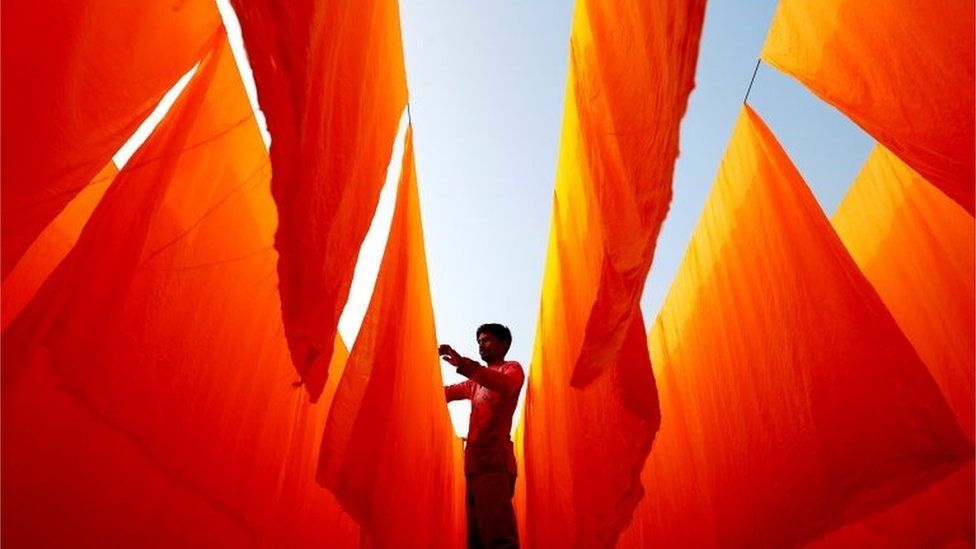
image copyrightReuters
Bangladesh is held up by many as a model of development, but as it marks 50 years of independence critics say it risks becoming a one-party state intolerant of dissent, threatening the democratic principles on which it was founded.
When cartoonist Ahmed Kabir Kishore was brought to a court in Dhaka last month, his brother was shocked to see how weak and traumatised he looked.
Mr Kishore told his brother Ahsan that he had been tortured in detention after a group of unidentified men forcibly took him from his residence at the height of the coronavirus pandemic last May.
His alleged crime – posting satirical cartoons and comments on Facebook criticising the health system before the outbreak and the government’s response to the pandemic.
His family had no information on the 45-year-old for several days after he was picked up. Then they heard that he had been arrested on charges of involvement in anti-state activities and spreading “rumours”.
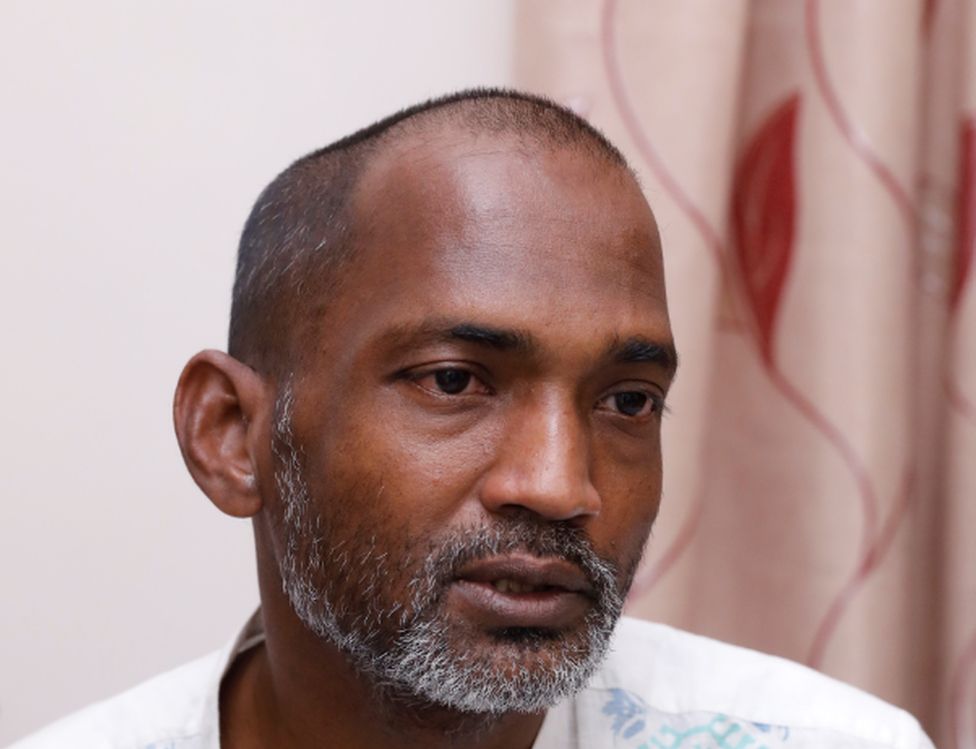
image copyrightDipu Malakar/Prothom Alo

Mr Kishore was denied bail six times by the courts. When it was finally granted, the cartoonist had already spent 10 months in jail under a notorious law, the Digital Security Act (DSA).
His family could not visit him in jail due to coronavirus restrictions. The identity of the men who took him away is still not clear and it’s also a mystery how he finally ended up at a police station in the capital.
“My brother’s left ear has been severely damaged and he’s struggling to walk. Doctors say he needs surgery on his right ear,” Ahsan Kabir told the BBC.
Despite all this, Mr Kishore is thankful that he is at least alive. Mushtaq Ahmed, a writer arrested in the same case last year, was less fortunate.
He died in prison a week before Mr Kishore was granted bail.
His death triggered widespread outrage and protests. Activists have demanded the government repeal the law, which they describe as draconian. Officials insist there was nothing suspicious in Mr Ahmed’s death.
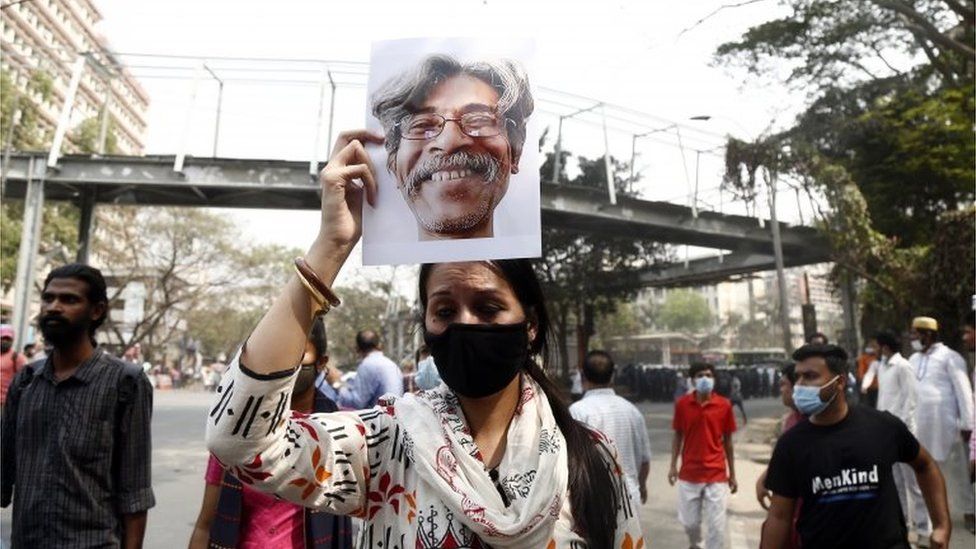
image copyrightEPA
There have been other abductions too.
Photojournalist Shafiqul Islam Kajol was forced into a van by a group of unidentified men in Dhaka last March. His family had no information on him for the next 53 days before he was found hundreds of kilometres away along the border with India, blindfolded and tied.
Then he spent the next seven months in prison charged under the DSA with sharing objectionable, defamatory and fake information about politicians from the governing Awami League party on Facebook.
Mr Kajol was finally released on bail in late December.
The DSA, passed despite objections from editors and civil society activists in October 2018, has a wide range of provisions for various offences, including 10 years in prison for destroying communal harmony or creating unrest or disorder.
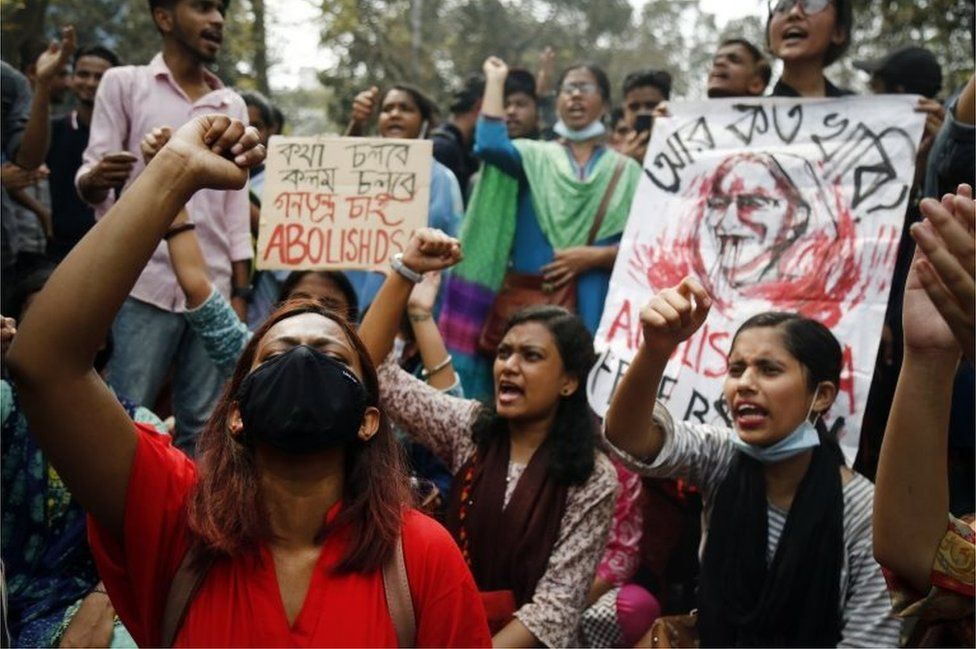
image copyrightEPA
Critics say the law is being widely misused to curb dissent and criticism of the government. The UK-based media watchdog, Article 19, says 312 people were prosecuted under the DSA in 2020. Of them, 70 were journalists.
“The use of the Digital Security Act has created a chilling effect on press freedom and civil society in Bangladesh,” said Rory Mungoven, Asia-Pacific chief at the Office of the UN High Commissioner for Human Rights.
“The Covid-19 pandemic has added a new dimension, with many people being arrested and charged under the DSA for comments published online that are critical of the government’s response,” Mr Mungoven told the BBC by email.
The Bangladeshi government insists that the Digital Security Act is “not an instrument for curbing dissent and criticism”.
“It is a necessary piece of legislation which was enacted as a result of the rapid digitisation… The aim is to make the digital sphere as secure as the physical world,” Shah Ali Farhad, special assistant to Prime Minister Sheikh Hasina, told the BBC.
Following intense criticism, Law Minister Anisul Huq recently said steps were being taken to ensure the law was not being abused and that no one could be arrested under it before an investigation had taken place.


Ms Hasina’s Awami League has been in power continuously since 2008. She is credited with bringing stability to politically volatile Bangladesh, boosting economic growth and also for clamping down on religious extremism.
Under her leadership, the country’s economy has grown at an average of 6-7% a year in the last 10 years.
Bangladesh has also emerged as the world’s second biggest exporter of ready-made clothes, after China. It shipped around $34bn worth of clothes in 2019 before the pandemic struck. The sector employs about four million people, most of them women.
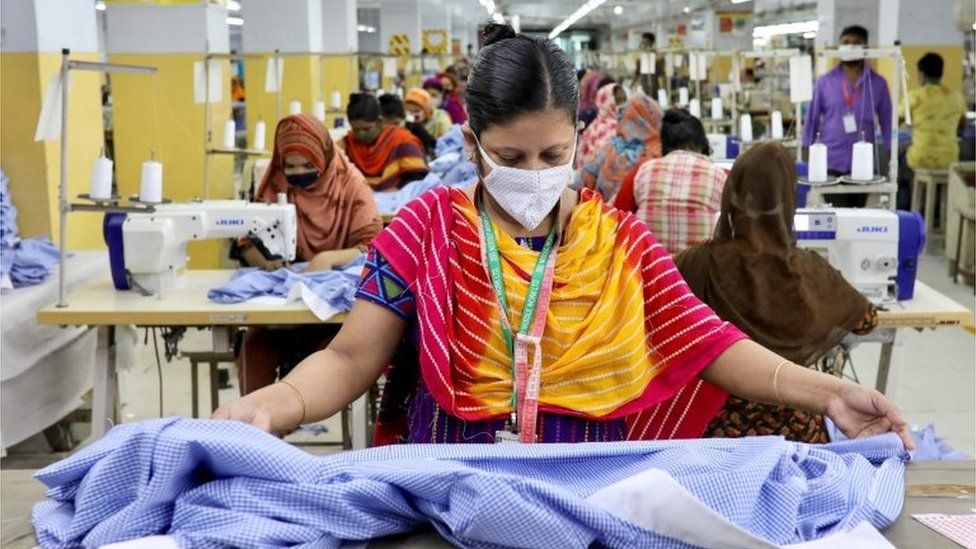
image copyrightReuters
Ms Hasina’s supporters say the country’s economic growth has helped to lift millions out of poverty and its record in primary education, health and social development is higher than some of its neighbours.
In the last two general elections (2014 and 2018) the Awami League won landslide victories. The main opposition alliance, which boycotted the 2014 vote, took part in the last one but alleged widespread vote-rigging and fraud.
The 12 years of Awami League rule have also been marred by accusations of enforced disappearances, extra-judicial killings and the jailing of numerous critics and dissidents.
According to Dhaka-based rights organisation Odhikar there have been 587 cases of enforced disappearances since 2009 – 81 people were found dead and another 149 are still missing.
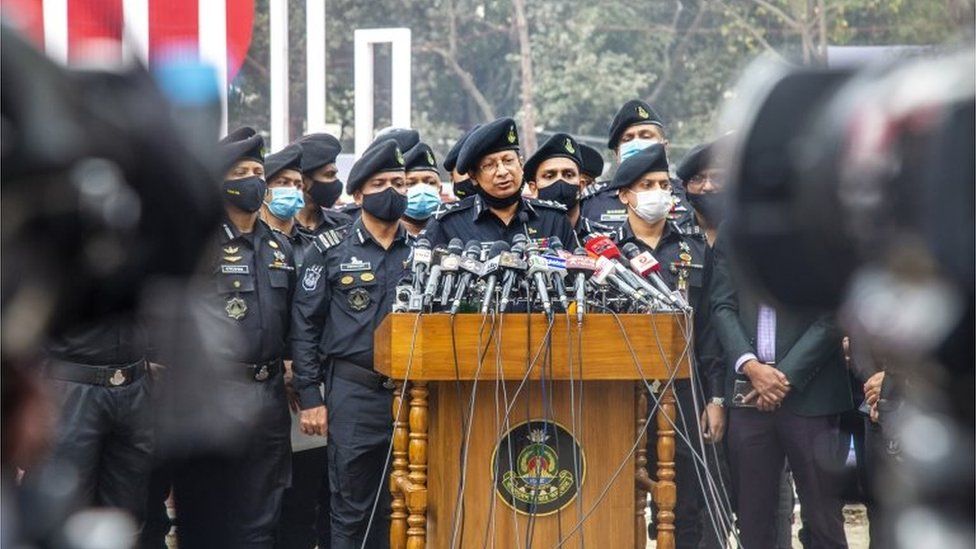
image copyrightEPA
Amnesty International says hundreds of people have died in extrajudicial killings since 2010. Security agencies like the Rapid Action Battalion are blamed for many of the unlawful deaths.
“In the last 10 years we have observed increasingly repressive tendencies from the authorities. Human rights, especially many of the civil and political rights of the people, have been seriously undermined,” said Sultan Mohammed Zakaria, a South Asia researcher at Amnesty International.
The Bangladeshi authorities strenuously deny all accusations of enforced disappearances and extrajudicial killings.
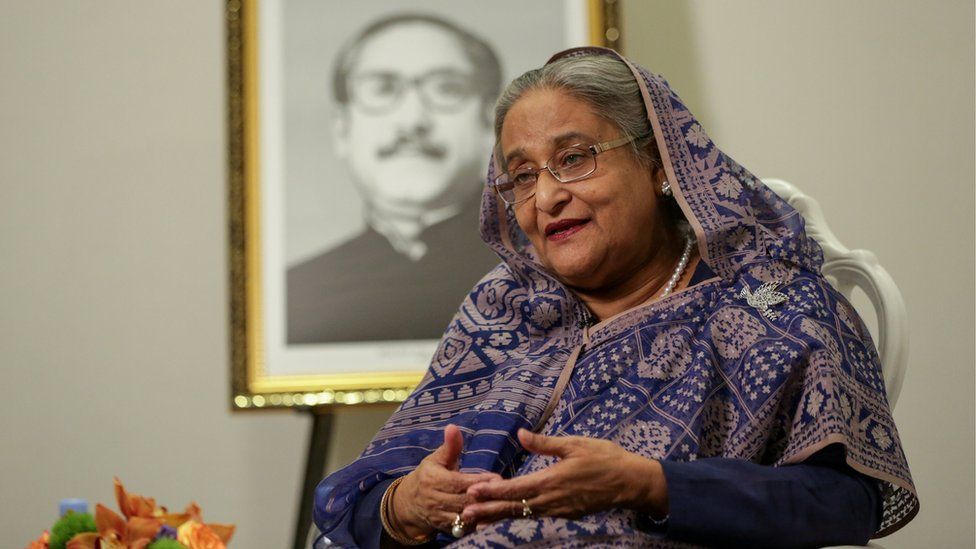
image copyrightReuters
“The government maintains zero tolerance policy to any form of extrajudicial activities by the law enforcement agencies,” Shah Ali Farhad from the prime minister’s office said.
Mr Shah also said some “miscreants disguise themselves as security agencies to carry out abductions and killings”.
But accusations that freedoms are being eroded have come back to haunt the government as it celebrates the 50th anniversary year of the country’s independence from Pakistan on 26 March.
This month Bangladesh is also celebrating the birth centenary of its founder Sheikh Mujibur Rahman, the father of Sheikh Hasina.


image copyrightGetty Images
- Civil war erupts in Pakistan, pitting the West Pakistan army against East Pakistanis demanding autonomy and later independence
- Fighting forces an estimated 10 million East Pakistani civilians to flee to India
- In December, India invades East Pakistan in support of the East Pakistani people
- Pakistani army surrenders at Dhaka and its army of more than 90,000 become Indian prisoners of war
- East Pakistan becomes the independent country of Bangladesh on 16 December 1971
- Exact number of people killed is unclear – Bangladesh says it is three million but independent researchers say there were up to 500,000 fatalities

Opposition leaders and activists argue that the country should be unified in marking such historic occasions, but political divisions run deep.
The main opposition Bangladesh Nationalist Party and other critics of the government say there is hardly any political space for them to function. They accuse the government of using strong-arm tactics to harass, intimidate and jail their supporters.
Kamal Hossain, who served as law and foreign minister under Sheikh Mujibur Rahman after independence in 1971, said the dominance of one political party is not good for democracy.
This current situation is “not at all what he [Sheikh Mujibur Rahman] wanted”, Mr Hossain, now an opposition leader, told the BBC. “Many positive steps could be taken to create an environment in which opposition politics is possible.”
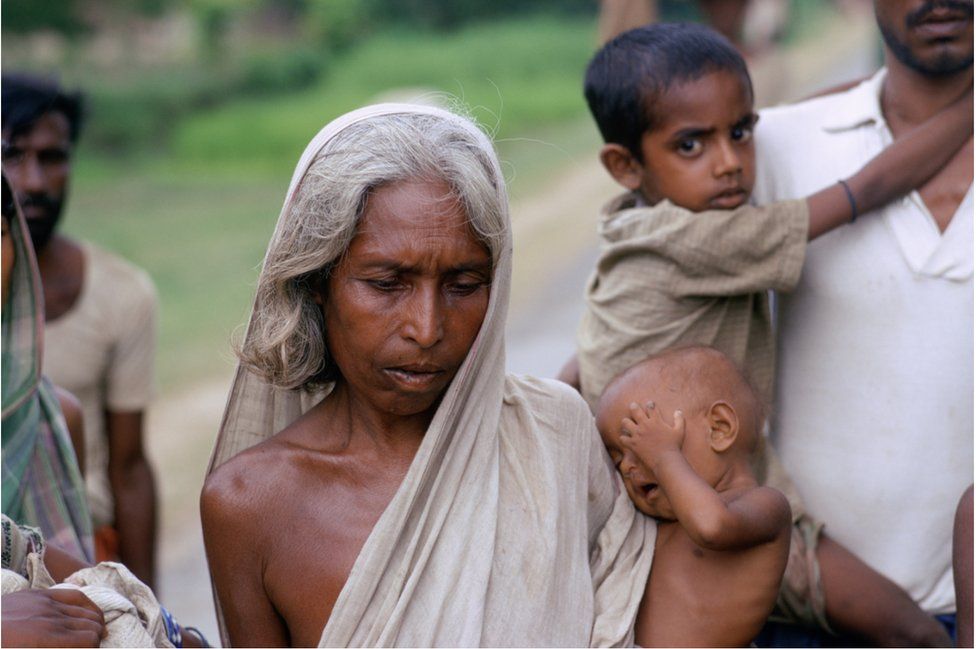
image copyrightGetty Images
Some analysts point out that if democratic space is shrunk, then those opposed to the government could be pushed towards religious hardliners, who have a sizeable following in the Muslim-majority nation of more than 160 million, with unforeseen political consequences.
Fifty years ago, few would have predicted a poor nation like Bangladesh would survive, let alone thrive, given its enormous challenges in the aftermath of a devastating independence war. Many faced the prospect of poverty and famine.
But half a century later, despite numerous political setbacks, natural disasters and military coups, Bangladesh has proved many doubters wrong.
“That is why we are concerned when there are trends to limit or curtail that democratic and civic space, which is a critical underpinning for sustainable development,” Rory Mungoven, the UN official, pointed out.
